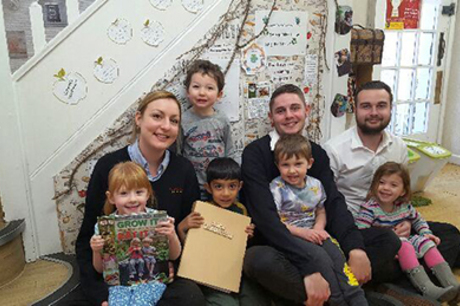
The nursery group's Lime Grove and Rowan Tree day nurseries are just two of around 50 early years settings in the UK to achieve the Eco-Schools Green Flag award for environmental awareness and conservation.
Both of the nurseries are powered by renewable wind and solar power, and children are involved in a variety of eco-projects. Materials are reused in all craft projects so that just over 1 per cent of waste ends up in landfill.
Eco-Schools is the largest environmental schools programme in the world. Operated by the Foundation for Environmental Education (FEE), it was launched in 1994 as a response to the 1992 UN Rio Earth Summit. The international scheme runs in more than 60 countries.
The programme was initially set up for schools, with 18,000 English schools currently registered and 1,200 holding the Green Flag award. It is run domestically by environmental charity Keep Britain Tidy.
In the two Childbase settings in Hertfordshire, the eco-committees have introduced vegetable and herb crops, birdhouses, a bug hotel, bee-friendly plants and a compost bin to the nurseries.
The two nurseries also appoint daily ‘eco-spies’ who wear stickers to identify them as they help other children ensure resources such as paper are not wasted, taps are not left running, and knowledge about conservation is shared.
Charlotte Lucas, manager of Lime Grove Day Nursery in Hemel Hempstead, said, ‘Respecting and protecting the environment is an important part of our commitment to give our children the best possible future, but we have been surprised by just how many children are fully engaged in these projects.’

Rowan Tree nursery's eco-committee
Manager of Rowan Tree Day Nursery in Welwyn Garden City Claire Ovenden said, ‘You have to remember that this is predominately a schools programme involving older children. That children as young as three can talk competently about how and why we need to protect the environment is cause for celebration and optimism for the future.
‘All the children love the activities and are learning so much about maths, science and the environment as they go. We are excited about the levels of collaboration we are seeing and how these projects are contributing to children’s self-confidence, development of communication skills and their general understanding of the world.’
Childbase Partnership runs 41 day nurseries across the south of England, providing 3,869 registered places for children aged between six weeks and five years.
The Green Flag award
In order to attain Green Flag accreditation, both nurseries and schools must first obtain Bronze and then Silver status based on an online self-assessment process.
Settings must demonstrate project work on at least three of the listed topics below, and show that they have followed all stages of the seven-step programme.
Settings must form an ‘eco-committee’ made up of staff and children to help focus activities on a chosen Eco-School topic. Bronze and Silver statuses can be gained by displaying work on one of the nine topics on offer, which are:
- biodiversity
- energy
- litter
- waste
- transport
- water
- school grounds
- healthy living
- global citizenship.
Eco-Schools also provides settings with a seven-step programme to follow. Bronze status requires settings to cover steps one to three and Silver four, five and six.
The seven steps are:
- forming an eco-committee
- carrying out an environmental review of the setting’s performance
- creating an action plan based on the review
- monitoring and evaluating changes made
- informing and involving the rest of the setting and wider community in the committee’s progress
- making links between the setting’s environmental activity and the curriculum
- creating an eco-code to unite the setting
Once an application for Green Flag status is submitted, an assessor will visit the setting to meet the eco-committee and evaluate the work done.
- To register with Eco-Schools visit http://members.eco-schools.org.uk/Register









